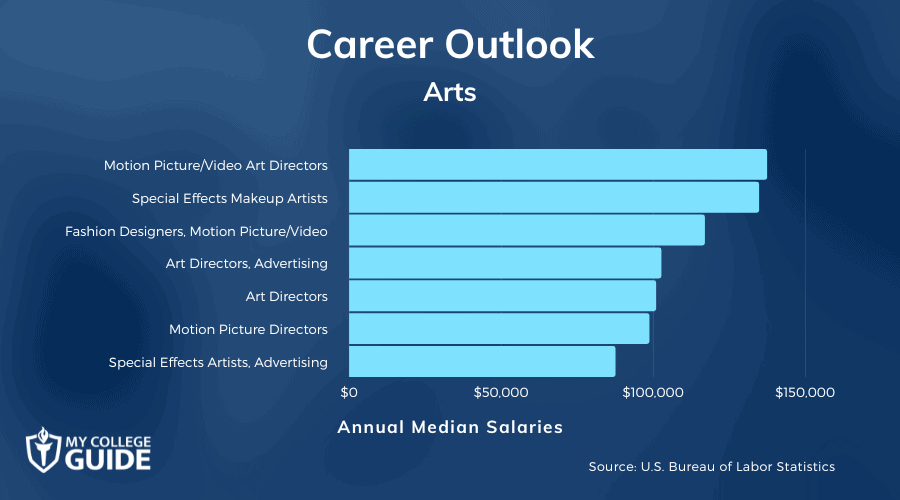Declaring a major in the arts can be a great way for creatives to build a foundation in artistic principles while opening the door to numerous art careers. These art careers give graduates the knowledge and skills to make their artistic passion a viable career.

This field of study is best for people with a preexisting passion for the arts, or even an interest in a specific medium. If a degree in the arts interests you, continue reading to see if it can get you closer to fulfilling your career goals.
Editorial Listing ShortCode:
If you are interested in pursuing an art degree, several reputable colleges offer a variety of online art degree programs that can help you achieve your goals.
What Can You Do With an Art Degree?

An art degree opens up a lot of opportunities. Whether you want to work in the film industry or have an independent art career, there are countless options for someone holding an art degree.
An art degree can allow you to catapult your passion for the arts into a career. For example, if you’re interested in motion pictures and film, you could become a film and video editor. According to the U.S. Bureau of Labor Statistics, film and video editors can earn an annual median salary of $60,360.
Editorial Listing ShortCode:
Perhaps you enjoy capturing life’s moments with your camera. In that case, you may want to become a photographer. Photographers earn an annual median salary of $38,950. You can also choose to be a graphic designer, interior designer, curator, or fine arts artist.
There are many art degree careers for those with an art degree. It is important to note, that you may make more or less than the salaries above based on your experience level.
5 Things You Can Do with a Degree in Arts
A degree in the arts leads to various opportunities across art careers. Should you pursue a career in the arts, your job prospects could include artist, photographer, art teacher, interior decorator, and filmmaker. Continue reading to gain a greater perspective on these careers.
1. Artist

Artists work within their chosen mediums to produce original pieces before selling their work, usually independently. Every artist works differently, so there is no standard for daily work. That said, in a general sense an artist will produce art, market themselves, and interact with clients.
2. Photographer

A photographer’s job is to take professional photos of either people or landscapes and sell them to clients. There are many ways to work as a photographer, whether it be as a freelancer or for an organization. Photographers may also work in fields like journalism or production.
Daily life for a photographer may involve shooting, editing photos, marketing themselves and their work, and communicating with clients. This varies depending on the individual and their circumstances.
3. Art Teacher

Art teachers are responsible for teaching students different artistic principles across artistic mediums to develop their creativity and expression. Generally speaking, art teachers can be found developing teaching outlines or lesson plans and facilitating activities for students.
4. Interior Decorator

Interior decorators take a client’s vision for a space and use furniture, lighting, decorations, and paint to fulfill that client’s vision. Interior designers may work both independently and for an organization.
Their daily tasks may include furnishing and decorating a space, working with clients, making designs, and shopping for supplies.
5. Filmmaker

Filmmakers work in different genres to produce media. This media could be in the form of movies, documentaries, television, music videos, and more. Filmmakers manage many moving parts, including a film crew, to accomplish their vision.
Editorial Listing ShortCode:
Should you pursue filmmaking, you can expect to spend your time reading scripts and directing both a crew and actors.
Arts Careers & Salaries

An art career can take many forms, from professional artistry to teaching students how to tap into their own creative talents.
Below you will find a list of the top 40 art careers & salaries according to data from the U.S. Bureau of Labor Statistics (BLS):
| Careers | Annual Median Salaries |
| Motion Picture/Video Art Directors | $137,380 |
| Special Effects Makeup Artists | $134,750 |
| Fashion Designers, Motion Picture/Video | $116,930 |
| Art Directors, Advertising | $102,630 |
| Art Directors | $100,890 |
| Motion Picture Directors | $98,680 |
| Special Effects Artists, Advertising | $87,540 |
| Special Effects Artists, Software | $84,540 |
| Web Designers | $79,890 |
| Music Producers | $79,000 |
| Animators, Motion Picture and Video | $78,790 |
| Fashion Designers | $77,450 |
| Industrial Designers | $77,030 |
| Art Teachers, Postsecondary | $75,940 |
| Industrial Designers, Manufacturing | $64,700 |
| Art Editors | $63,350 |
| Fashion Designers, Apparel Manufacturing | $63,320 |
| Animators | $62,077 |
| Elementary Teachers | $61,400 |
| Fine Artists, Sculptors | $60,820 |
| Interior Designers | $60,340 |
| Drafters | $60,290 |
| Curators | $60,110 |
| Archivists | $60,050 |
| Music Therapists | $59,500 |
| Graphic Designers, Advertising | $52,050 |
| Graphic Designers | $50,710 |
| Interior Designers, Furniture Stores | $48,790 |
| Art and Design Workers | $48,220 |
| Art Therapists | $47,940 |
| Wardrobe Assistants | $47,850 |
| Museum Technicians and Conservators | $47,630 |
| Graphic Designers, Newspaper, and Periodicals | $44,540 |
| Graphic Designers, Printing Services | $39,090 |
| Photographers | $38,950 |
| Independent Artists, Writers, and Performers | $38,490 |
| Digital Photo Technicians | $36,590 |
| Craft Artists | $35,930 |
| Floral Designers | $29,880 |
| Wedding Makeup Artists | $29,670 |
The table above shows the diversity within the art world, and there are countless ways that you can use your art degree to meet specific career ideas. From the dynamic world of graphic design to fine art creation or the management of visual productions, there is something for everyone in the field of art.
When it comes to a broad field like the fine arts, it can be difficult to pinpoint the exact outlook for degree graduates as a whole. Resources such as the BLS can provide valuable information on the best art careers for you that include average salary and the art career outlook.
Editorial Listing ShortCode:
To give you an idea of what to expect after graduating with an art degree, the BLS projects that art and design occupations will grow 2% over the next 10 years, adding about 20,500 artistic jobs. The median annual wage for arts and design occupations is $48,220.
If you see the world through a creative lens and want to share your talent with the world, then earning a degree in art can be the perfect starting point to launch a successful career. For those who put dedication and hard work into mastering their craft, there is a world of opportunity out there for those with an art degree.
How to Know if a Degree in Art is Right for Me

Enrolling in an art program is a big decision, so consider the factors below before committing to a program.
- Am I Willing to Take on the Financial Cost? College education tends to be expensive, but every program has requirements that are likely to increase the cost. You should consider the cost of tuition, room and board, and even art supplies and the price of excursions. These programs require students to purchase their own art supplies and sometimes even tickets to museums.
- Can I Handle Constructive Criticism? Art programs are different from other programs because they don’t simply give students a grade at the end of an assignment. Oftentimes assignments are criticized throughout the process of an assignment in order for students to properly grasp the principles being taught. You should ask yourself if you can handle criticism without taking offense because if you can’t then the program may not be as productive for you.
- Do I Enjoy Working on My Own? Similar to architecture careers, art careers can be very solitary because artists need time to produce their work on their own. As such, art programs reflect this, meaning students should be prepared to do much of their work alone. Many students work best in collaborative environments, so you should determine if you can work within this setting.
- Is the Art Scene Right For Me? Studying art means attending numerous museums and exhibits to gain more perspective on and exposure to the art scene. If this doesn’t interest you, then an art program may not be right for you.
Whether or not an art program is right for you can only be determined by you, but asking yourself the above questions can help you make your decision.
Is Financial Aid Available?

The cost of education is on the rise, causing many students to seek alternative methods of funding. If you require help to fund your education, then you’ll be happy to know that there are various options you may pursue.
Many students file for federal financial aid known as FAFSA. The FAFSA requires students to submit their financial information so that the government can determine if they’re eligible for aid. Aid is given in the form of loans that are required to be paid back.
Additional forms of aid include scholarships and grants that may be administered on a local and national level, as well as through your school. These forms of aid don’t need to be paid back, but they do require an application process that doesn’t guarantee you receive aid.
What Is an Art Degree?

An art degree can take on many forms, and the program that you choose to commit to depends upon your long-term goals. If you have a talent for drawing, painting, or music, then pursuing a degree in fine arts will help you build the technical skills needed to hone your craft.
If technology and production are more your style, then there are a variety of degrees in computer art design or theater that you can choose from to reach your career goals. At most reputable colleges, there are several art degrees offered at an associate’s, bachelor’s, or graduate level.
Editorial Listing ShortCode:
The amount of education that you commit to depends upon the career path you wish to pursue after graduation. If teaching or top-level managerial positions fit in with your long-term goals, then you will likely find that higher-level art degrees are the better match for you.
A few of the many concentrations that you may be able to choose from after enrolling in an art degree program include:
- Computer art and design
- Art education or history
- Cinematography
- Advertising
- Photography
- Painting, drawing, and sculpture
If traditional, on-campus classes won’t work with your busy schedule, you may find that online art and design degrees offer you the flexibility that you need to meet your other work or family obligations.
What Are the Educational Requirements for Art?

There are different educational requirements depending on the profession you choose. Below are some requirements you may want to consider before choosing your program.
- Associate – Associate programs expose students to their medium of choice. These graduates may go on to become photographers, web designers, and fine artists.
- Bachelor’s – A Bachelor’s degree opens the door for more careers in the arts since it fulfills many of their entry-level requirements. These careers include art teachers, museum curators, and multimedia artists.
- Master’s – A master’s degree opens the doors for art careers with high earning potential, including art director and professor.
- Doctorate – Most art programs don’t offer doctorate programs since most art careers don’t require a doctorate for success. Aspiring professors tend to pursue a doctorate in the arts.
While requirements vary, as with some biology careers, for example, many art careers can be pursued by simply achieving a bachelor’s degree.
What Do You Learn in Arts?

What you learn through an arts program may vary, especially when you choose your specialty, but students will still be exposed to essential historical and theoretical concepts in art.
Editorial Listing ShortCode:
The skills you learn in an arts program include how to analyze art, how to deeply understand your discipline, and how to think critically. The foundation of your learning will be based on historical and theoretical courses, which will inform your knowledge of style and technique.
What Are Some Entry-level Jobs for Art Majors?

As discussed above, many careers in the arts field can be entered with a bachelor’s degree. As such, there are many entry-level professions in the arts that you may want to consider. Some of these professions include:
- Art Teacher
- Fine Artist
- Museum Curator
- Graphic Designer
- Photographer
Of course, it should be noted that these careers cannot be guaranteed since there are many factors that contribute to the hiring process. If you have an interest in the careers above, you can begin researching any additional requirements they may have.
What Are the Highest Paying Art Jobs and Careers?

Many students considering professions in art want to know if there are careers in art that pay well. While salaries may vary depending on the position, the Bureau of Labor Statistics indicates numerous positions that can offer art majors a good living.
The highest-paying art careers include:
- Art Director
- User Experience Designer
- Creative Director
- Director
- Interior Designer
If you’re interested in these careers, make sure to research any additional requirements to attain these positions. Careers can never be guaranteed, but having an art degree can be a great step in the right direction.
Is an Art Degree Worth It?

Yes, an art degree is worth it for many professionals. Arts and design careers allow graduates to pursue a career that is fulfilling while making the money that is required to live and pursue their passion.
Editorial Listing ShortCode:
Many artists struggle to work in fields they’re not passionate about, which is why pursuing a career in art is practically necessary for them. The Bureau of Labor Statistics states that there will be approximately 20,500 art-based jobs emerging within the next 10 years. Arts and design careers may be worth it if art is your passion and you seek fulfillment in your professional life.
Getting Your Art Degree Online

Getting a degree in art can be beneficial for many people, especially if you already have a love for art. If you have this appreciation, then a degree in art can help you build the bridge between passion and career.
By becoming an art major, you are dedicating yourself to learning the history and theories of art while honing your skills on a daily basis. Careers in art are viable, especially if you have the dedication to pursue your craft.
If a career in art interests you, then you can get your education started by researching accredited universities today.
